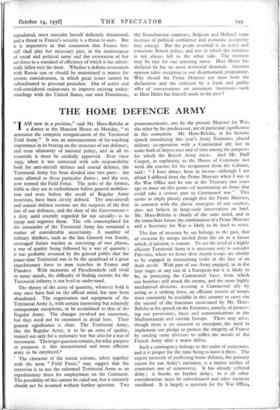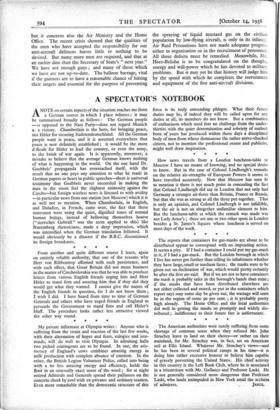THE HOME DEFENCE ARMY
IAM now in a position," said Mr. Hore-Belisha at 1 a dinner at the Mansion House on Monday, " to announce the complete reorganisation of the Territorial Field Army." It was an announcement of far-reaching importance in its bearing on the structure of our defences, and even ultimately of national policy, and in all its essentials it must be cordially approved. Ever since 1935, when it was entrusted with sole responsibility both for anti-aircraft defence and coastal defence, the Territorial Army has been divided into two parts : the units allotted to these particular duties ; and the rest, now termed the Field Force. The tasks of the former, liable as they are to embodiment before general mobilisa- tion and even before the recall of Regular Army reservists, have been clearly defined. The anti-aircraft and coastal defence sections are the outposts of the first line of our defences, and the duty of the Government— a duty until recently regarded far too casually--is to equip , and organise them. The role contemplated for the remainder of the Territorial Army has remained a matter of considerable uncertainty. A number of military thinkers, such as the late General von Seeckt, envisaged future warfare as consisting of two phases, a war of quality being followed by a war of quantity ; it was probably assumed by the general public that the peace-time Territorial was to be the spearhead of a great expeditionary force to man trenches in France and Flanders. With memories of Passchendaele still vivid in many minds, the difficulty of finding recruits for the Territorial infantry is not hard to understand.
The theory of the army of quantity, whatever hold it may once have had on the official mind, has now been abandoned. The organisation and equipment of the Territorial Army is, with certain interesting but relatively unimportant exceptions, to be assimilated to that of the Regular Army. The changes involved are important, but they need not be examined in detail here. Their general significance is clear. The Territorial Army, like the Regular Army, is to be an army of quality, trained not only for a stationary war but also for a war of movement. The larger question remains, for what purpose or purposes is this reconstituted and more efficient army to be employed ?
The character of the recent reforms, taken together with the term " Field Force," may suggest that the intention is to use the reformed Territorial Army as an expeditionary force for employment on the Continent. The possibility of this cannot be ruled out, but it certainly should not be. assumed without further question. Two pronouncements, one by the present Minister for War, the other by his predecessor, are of particular significance in this connexion. Mr. Hore-Belisha, in his historic speech introducing this year's Army Estimates, placed military co-operation with a Continental ally last in order both of importance and of time among the purposes for which the British Army exists. And Mr. Duff Cooper, in explaining to the House of Commons last week the reasons for his resignation from the Cabinet, said : " I have always been in favour—although I am afraid I differed from the Prime Minister when I was at the War Office and he was at the Treasury two years ago or more on this point—of maintaining an Army that could take a serious part in Continental war." This seems to imply plainly enough that the Prime Minister, in common with the classic strategists of our country, does not believe in large-scale intervention on land. Mr. Hore-Belisha is clearly of the same mind, and in the immediate future the combination of a Prime Minister and a Secretary for War is likely to be hard to resist.
The fear of invasion by sea belongs to the past, that of invasion by troops landed from the air to a future which, if existent, is remote. To see the need of a highly efficient Territorial Army it is necessary only to consider Palestine, where no fewer than 20,000 troops are shortly to be engaged in maintaining order in the face of an Arab revolt. With part of our Army engaged, as in the later stages at any rate of a European war it is likely to be, in protecting the Continental bases from which our bombers will attack the enemy, and the more highly mechanised divisions assisting a Continental ally by acting as a striking force, an efficient reserve of troops must constantly be available in this country to carry out the second of the functions enunciated by Mr. Hore- Belisha in his speech on the Estimates, namely, of protect- ing our possessions, bases and communications in the Mediterranean and outside Europe. There may arise, though there is no occasion to anticipate, the need to implement our pledge to protect the integrity of France by sending some divisions to stiffen the morale of the French Army after a major defeat.
Such a contingency belongs to the realm of conjecture, and it is proper for the time being to leave it there. The urgent necessity of perfecting home defence, the primary reason for our Army's existence, is a matter neither of conjecture nor of controversy. It has already suffered delay ; it brooks no further delay ; to it all other considerations must be subordinated and other interests sacrificed. It is largely a question for the War Office, but it concerns also the Air Ministry and the Home Office. The recent crisis showed that the qualities of the men who have accepted the responsibility for our anti-aircraft defences leaves little or nothing to be desired. But many more men are required, and that at an earlier date than the Secretary of State's " next year." We have not enough guns ; and many of those which we have are not up-to-date. The balloon barrage, vital if the gunners are to have a reasonable chance of hitting their targets and essential for the purpose of preventing the spraying of liquid mustard gas on the civilian population by low-flying aircraft, is only in its infancy. Air Raid Precautions have not made adequate progress either in organisation or in the recruitment of personnel. All these defects must be remedied. Meanwhile, Mr. Hore-Belisha is to be congratulated on the thought, energy and will-power which he has devoted to military problems. But it may yet be that history will judge him by the speed with which he completes the recruitment and equipment of the five anti-aircraft divisions.



















































 Previous page
Previous page